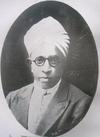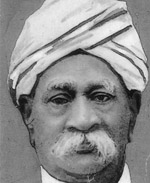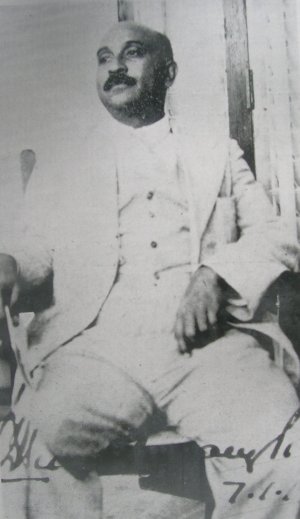
Chakravarti Rajagopalachari BR,popularly known as Rajaji or C.R.,also known as Mootharignar Rajaji,was an Indian statesman,writer,lawyer,and Indian independence activist. Rajagopalachari was the last Governor-General of India,as when India became a republic in 1950 the office was abolished. He was also the only Indian-born Governor-General,as all previous holders of the post were British nationals. He also served as leader of the Indian National Congress,Premier of the Madras Presidency,Governor of West Bengal,Minister for Home Affairs of the Indian Union and Chief Minister of Madras state. Rajagopalachari founded the Swatantra Party and was one of the first recipients of India's highest civilian award,the Bharat Ratna. He vehemently opposed the use of nuclear weapons and was a proponent of world peace and disarmament. During his lifetime,he also acquired the nickname 'Mango of Salem'.

The Madras Presidency or Madras Province,officially called the Presidency of Fort St. George until 1937,was an administrative subdivision (province) of British India and later the Dominion of India. At its greatest extent,the presidency included most of southern India,including all of present-day Andhra Pradesh,almost all of Tamil Nadu and parts of Kerala,Karnataka,Odisha and Telangana in the modern day. The city of Madras was the winter capital of the presidency and Ooty was the summer capital.

Paramasivan Subbarayan was an Indian politician,freedom fighter and diplomat and was the First Minister of Madras Presidency,India's ambassador to Indonesia and Union Minister of Transport and Communications in Jawaharlal Nehru's government. He was the father of General P. P. Kumaramangalam,who served as India's Chief of Army staff,and of politician Mohan Kumaramangalam. He was also the grandfather of INC and BJP politician and Union Minister Rangarajan Kumaramangalam.

Sir Ponnambala Thiaga Rajan was the First Minister of Madras Presidency from 4 April 1936,to 24 August 1936. He was also the last President of the Justice Party. P. T. Rajan was born in a Thondaimandala mudaliar family in Uthamapalayam. His ancestors were from Kanchipuram. He attended The Leys School,Cambridge and later,Jesus College,Oxford. He graduated in history and law,and practiced as an advocate for some time before joining the Justice Party.

Minjur Bhakthavatsalam was an Indian independence activist and politician who served as the chief minister of Madras State from 2 October 1963 to 6 March 1967. He was the last Congress chief minister of Tamil Nadu and the last to have taken part in the Indian independence movement.

Rao Bahadur Sir Kurma Venkatareddi NaiduKCSI (1875–1942),also known as K. V. Reddi Naidu,was an Indian politician,lawyer,diplomat,and academic. He served as the Premier of Madras Presidency and was one of only two Indians to hold the position of Governor of Madras Presidency,making him the only individual in history to have served as both Premier and Governor. As a prominent leader of the Justice Party,Naidu was known for his efforts to promote social equality,the abolition of untouchability,and social reforms. He was instrumental in the establishment of the first women's college in the Andhra region,located in Eluru.

Tamil Nadu Legislative Council was the upper house of the former bicameral legislature of the Indian state of Tamil Nadu. It began its existence as Madras Legislative Council,the first provincial legislature for Madras Presidency. It was initially created as an advisory body in 1861,by the British colonial government. It was established by the Indian Councils Act 1861,enacted in the British parliament in the aftermath of the Indian Rebellion of 1857. Its role and strength were later expanded by the second Council Act of 1892. Limited election was introduced in 1909. The Council became a unicameral legislative body in 1921 and eventually the upper chamber of a bicameral legislature in 1937. After India became independent in 1947,it continued to be the upper chamber of the legislature of Madras State,one of the successor states to the Madras Presidency. It was renamed as the Tamil Nadu Legislative Council when the state was renamed as Tamil Nadu in 1969. The Council was abolished by the M. G. Ramachandran administration on 1 November 1986. In 1989,1996 and 2010,the DMK regime headed by M. Karunanidhi tried to revive the Council. The former AIADMK regime (2016-2021) expressed its intention not to revive the council and passed a resolution in the Tamil Nadu Legislative Assembly in this regard.

P. Kakkan,known as Kakkan,was an Indian politician and freedom fighter who served as a member of the Constituent Assembly of India,Member of Parliament,President of the Tamil Nadu Congress Committee and in various ministerial posts in Congress governments in the erstwhile Madras state between 1957 and 1967.

Tiruvengimalai Sesha Sundara Rajan (1880–1953) was an Indian medical doctor,politician and freedom-fighter who served the Minister of Public Health and Religious Endowments in the Madras Presidency from 1937 to 1939.

The first legislative assembly Election to the Madras state based on universal adult suffrage was held in 27 March 1952. This was the first election held in Madras state after the Indian Independence. This election was officially known as the 1951 Madras State Election,even though through delays,actual voting didn't take place until early 1952.

Kala Venkata Rao was an Indian independence activist and politician. He served as the Minister for Revenue in the governments of the Madras Presidency and Andhra Pradesh. He also served as the Minister of Finance in the latter.

The Tamil Nadu Legislative Assembly is the unicameral legislature of the Indian state of Tamil Nadu. It has a strength of 234 members,all of whom are democratically elected using the first-past-the-post system. The presiding officer of the Assembly is the Speaker. The term of the Assembly is five years,unless dissolved earlier.

Balasubramanian Parameswaran was an Indian politician and former Member of the Legislative Assembly of Tamil Nadu. He was elected to the Tamil Nadu legislative assembly from Maduranthakam constituency as an Indian National Congress candidate in 1946,1952,and 1962 elections. He was the grandson of Rettamalai Srinivasan,a pioneer in the Scheduled Caste movement. He was educated at the St. Gabriels High School and Presidency College,Madras. He served as private secretary to another Scheduled Caste leader M. C. Rajah. During 7 April 1949 –9 April 1952,he was the minister for Firka development,Khadi,Cottage industries,Fisheries,Cinchona and Harijan uplift in the P.S Kumaraswamy Raja ministry. During 1952–54,he was the mayor of Madras. From 13 April 1954 until 31 March 1957,he was the minister for Transport,Harijan Uplift,Hindu Religious Endowments,Registration and Prohibition in Kamaraj ministry. During 1958–62,he was a member of the Rajya Sabha –the upper house of the Indian parliament.

The second legislative assembly election for the Madras Presidency after the establishment of a bicameral legislature by the Government of India Act of 1935 was held in 1946. The election was held after 6 years of Governor's rule starting from 1939,when the Indian National Congress government of C. Rajagopalachari resigned protesting Indian involvement in World War II. This was the last election held in the presidency - after Indian independence in 1947,the presidency became the Madras state. The election was held simultaneously with that of the Legislative Council. The Congress swept the polls by winning 163 out of 215 seats. The years after this election saw factionalism in Madras Congress party with divisions across regional and communal lines. Competition among T. Prakasam,C. Rajagopalachari and K. Kamaraj resulted in the election of Prakasam as the prime minister initially. But he was later defeated by Omandur Ramaswamy Reddiar with Kamaraj's support. In turn,Reddiar himself was ousted to make way for P. S. Kumaraswamy Raja with the support of Kamaraj.

The first legislative council election to Madras Presidency after the establishment of dyarchical system of government by the Government of India Act 1919,was held in November 1920. Indian National Congress boycotted the election due to its participation in the Non-cooperation movement. The election occurred during the early stages of non-Brahmin movement and the major issue of the election was anti-Brahminism. Justice party won the election with no significant opposition and A. Subbarayalu Reddiar became the inaugural First Minister of the Madras Presidency.

The third legislative council election to Madras Presidency after the establishment of dyarchical system of government by the Government of India Act,1919,was held in November 1926. Justice party lost the election to Swaraj Party. However,as the Swaraja Party refused to form the Government,the Governor of Madras set up an independent government under the leadership of P. Subbarayan and with the support of nominated members.

Rao Sahib Vellore Iyyasamy Munuswamy Pillai also spelled as Munisami Pillai,was an Indian businessman,politician,Scheduled Caste activist and activist of the Indian independence movement who served as the Minister for Agriculture and Rural Development in the government of C. Rajagopalachari from 1937 to 1939.
The second legislative council election for the Madras Presidency after the establishment of a bicameral legislature by the Government of India Act of 1935 was held in March 1946. The election was held after 6 years of Governor's rule starting from 1939,when the Indian National Congress government of C. Rajagopalachari resigned protesting Indian involvement in World War II. This was the last direct election held for the Madras Legislative Council in the presidency - after Indian independence in 1947,the presidency became the Madras state and direct elections to the council were abolished. The election was held simultaneously with that of the Legislative Assembly. The Congress swept the polls by winning 32 out of 46 seats. The years after this election saw factionalism in Madras Congress party with divisions across regional and communal lines. Competition among T. Prakasam,C. Rajagopalachari and K. Kamaraj resulted in the election of Prakasam as the Premier initially. But he was later defeated by Omandur Ramaswamy Reddiar with Kamaraj's support. In turn,Reddiar himself was ousted to make way for P. S. Kumaraswamy Raja with the support of Kamaraj.

M. Muhammad Ismail was an Indian politician and social worker from southern Indian state Tamil Nadu. he was a founder of the Indian Union Muslim League party after the partition of British India. He was popularly known in Tamil Nadu and Kerala as the "Quaid-e-Millat". Ismail was a member of Madras Legislative Assembly and Leader of the Opposition (1946—52). He was also a member (1948—50) of the Constituent Assembly,the drafting body of the constitution of India. He was also a member of Rajya Sabha (1952—58) and Lok Sabha.
















